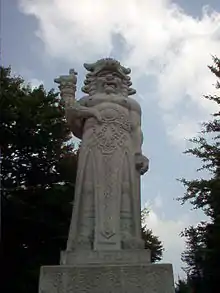Radegast (god)
Radegast, also Radagast, Radigost, Redigast, Riedegost, or Radogost is an old god of Slavic mythology.[1] Since the name can easily be dialectically adjusted and translated as "dear guest" or "welcomed guest", Radegast was proclaimed as the Slavic god of hospitality and as such entered the hypothetical, reconstructed Slavic pantheon. Even myths concerning him were constructed based on various folk customs of sacred hospitality. Similar customs, however, are known in many Indo-European mythologies without a distinct deity associated explicitly with them. Another possible etymology may be from Slavic "rada"—council, and "gościć", "hostit", "goszczący"—to host, Radogost being the name of the council or assembly host, leader, or speaker, and one of the attributes of the god. This view could be supported by the political role Radegast temple played in the life of West Slavic tribes. According to some literary sources, he is also the god of war, night, fire, and the evening sky.[2] Radegast is completely black, is armed with a spear and helmet, and it pleases him to be invited to banquets.
| Radegast | |
|---|---|
God of hospitality | |
 | |
| Other names |
|
| Gender | Male |
| Region | Europe |
| Ethnic group | Slavs |
.png.webp)
History
Radegast is mentioned by Adam of Bremen in his Gesta Hammaburgensis Ecclesiae Pontificum as the deity worshipped in the Lutician (West Slavic) city of Radgosc. Likewise, Helmold in his Chronica Slavorum wrote of Radegast as a Lutician god. However, Thietmar of Merseburg earlier wrote in his Chronicon that the pagan Luticians in their holy city of "Radegast" worshiped many gods, the most important of which was called Zuarasici, identified as either Svarog or Svarožič. According to Adam of Bremen, Johannes Scotus, Bishop of Mecklenburg, was sacrificed to this god on 10 November 1066 during a Wendish pagan rebellion against Christianity.
Mythology

According to one of the romantic authors, Radegast was beloved by Hors, described as the beautiful young goddess of the moon. However, he ignored her, unlike the god of the wind Stribog, who loved her. Stribog secretly stole Radegast's cloak and snuck into Hors' chamber towards morning, who let him seduce and impregnate her. Radegast was outraged, but not because of Hors but rather for the stolen coat. Hors felt cheated and lonely. She begged for mercy for her newborn girl and suggested that she could be a goddess of autumn, but the main god Svarog disagreed and the dispute was not settled. As a result, this season does not have a goddess and the goddess Živa fights over it with the goddess Marzanna.[2]
Czechia and Slovakia
Mt. Radhošť, in the Moravian-Silesian Beskids mountain range, is traditionally associated with the worship of this god; according to (modern) legend, missionaries Cyril and Methodius, when they visited the mountain on their trip to Great Moravia, had his idol demolished.
The original statue once placed on Mt. Radhošť, sculpted in 1929 by Albin Polasek, is now located in the town hall of Frenštát pod Radhoštěm. When the statue was moved to the mountain in 1931, the truck carrying it became stuck in a steep turn, and heavy rain accompanied by storm and lightning killed one of the soldiers.[3] A second casting by Albin Polasek stands in the center of Prague Zoo.
The granite version, now found on Mt. Radhošť, is a more recent copy commissioned by the Radegast beer company in 1998. More information and sculptures of Radegast are found at Polasek Museum in Winter Park, Florida. The name Radhošť itself is supposed to be a Czech transcription of Radegast.
In popular culture
- Radagast the Brown is a fictional character in J. R. R. Tolkien's Middle-earth legendarium. He is one of the wizards and lives among animals.[4]
- Radegast is the third studio album by Czech heavy metal band Citron, released in 1987.[5] The record also contains the tracks "Radegast I" and "Radegast II".
References
- Aitamurto, Kaarina; Simpson, Scott (20 October 2014). Modern Pagan and Native Faith Movements in Central and Eastern Europe. Routledge. ISBN 9781317544623 – via Google Books.
- Book Báje a mýty starých slovanů by Ivan Hudec, Slovart, 1994
- "Pohanský bůh Radegast".
- Orr, Robert (1994). "Some Slavic Echos in J. R. R. Tolkien's Middle-earth". Germano-Slavica. 8: 23–34.
- "Citron - Radegast". discogs.com. Retrieved 22 January 2021.
External links
 Media related to Radegast (deity) at Wikimedia Commons
Media related to Radegast (deity) at Wikimedia Commons